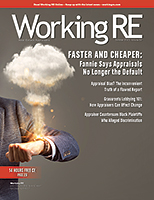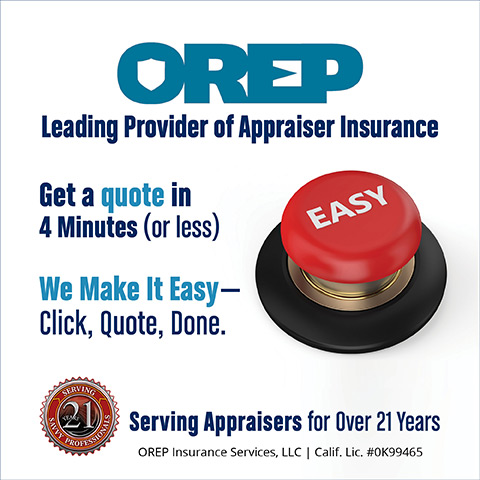 |
> The Appraiser Coach
> OREP E&O |
Problems When Appraising Airbnb & VRBO Properties
by Richard Hagar, SRA
Short-Term Rentals (STRs) are a great alternative for people who don’t want to stay in a hotel. Maybe it’s cheaper for a large family who needs multiple rooms? Perhaps it’s more fun for a group to stay in a large home with numerous amenities such as a private swimming pool and a tricked-out kitchen? There are a variety of STRs that even include surfboards, ski equipment, golfcart, lakeside dock, jet-skis and even a few with a boat. The amenities that STRs can include are endless.
Imagine all of the furniture, TVs, stereo equipment, dishes, pots and pans, cooking utensils, blenders and a mocha Frappuccino machine all set up in a home waiting for the family on vacation…or a place where you and 30 friends can party over the weekend. No problemo, just jump on to one of the dozen different websites, ogle at the nice photos, pick the place with the most personal property & highest rating, use your credit card to book your next weekend stay, wait for the approval by the owner, and then it’s time to party!
Now, here comes the problem. Residential appraisers are being asked to appraise these properties, along with their elevated income, as “typical” residential properties. These requests involve homes in numerous vacation spots ranging from Sedona, San Diego, Montana, Lake Tahoe, to Miami, New York, Seattle, New England, and every vacation spot in between.
Appraisers are being told by their AMC clients and loan officers to appraise these as residential properties. They are told it’s fine to use the total yearly income and “simply divide by 12” to produce a monthly income that can be used to value these places using a Gross Rent Multiplier (GRM). But is it really that simple? Short answer—no. Long answer—it’s complicated.
First of all, the value of an STR has three major components:
1) the real estate,
2) personal property, and
3) the business.
The business side includes replacing worn out or damaged furniture, window coverings, bedspreads, towels, the property’s internet listings, credit card processing, weekly cleaning, and daily management decisions involved with running the STR business. On top of that, what if the credit card is stolen and the last party animal damaged the house or fell off the deck and wants to sue the owner for a defective deck railing? STRs are far more than real estate; they include a business also known as a “growing concern” or intangible property.
There’s conflict and confusion because clients, AMCs, and lenders want what they want, and standard appraisal practices and definitions are standing in their way. They want the property value higher and believe that using a daily rental rate will increase the value of a house. The result is misleading statements such as: “This appraisal isn’t going to FNMA so… etc. etc.” However, they still want you to use a FNMA form. So, if it’s not going to FNMA, how about we use a GPAR form and see what happens—I bet they demand the use of the 1004 form. In other words, appraisers are being misled by ignorant people willing to throw us under the bus so the client can make a profit.
A lender’s confusion might relate to income. Lenders can use total yearly “STR income” to qualify the borrower, but “monthly rent income” must be used to qualify the property. I’ve had lenders tell me “See, see I told you that you can use the STR income.” What they don’t appear to understand is that monthly income is the income received once a month based on the real estate; not a business, personal property, and real estate. They are the ones confused, not us.
(story continues below)
(story continues)
Maybe some definitions and regulations will help explain things.
Here’s a sample state law:
“Short-term rental” means… a dwelling unit, or portion thereof, that is offered or provided to a guest by a short-term rental operator for a fee for fewer than thirty consecutive nights.”
Webster’s Dictionary.
Business (noun) ~
- a usually commercial or mercantile activity engaged in as a means of livelihood.
- a commercial or industrial enterprise.
- dealings or transactions, especially of an economic nature.
From the Appraisal Institute, The Appraisal of Real Estate:
- A usually commercial or mercantile activity engaged in as a means of livelihood.
- A going concern [value] is an intangible that attaches to the tangible assets [real estate] of some businesses.
- Going-concern value refers to the total value of a property, including both real property [tangible] and intangible personal property attributed to business value.
This is where lenders and others become confused. Just because it involves real estate doesn’t mean you include intangible value when valuing the real estate. Appraisers can value these, but USPAP has some requirements and one of them is separating the value of the real estate from the added value of the personal property and business.
USPAP / AO-29
Within appraisal practice there are three disciplines:
1. real property,
2. tangible personal property, and
3. intangible property including business interests,…
USPAP SR 1-2(e)(iii) states that it requires appraisers to:
“identify and consider the effect on value of any personal property, trade fixtures, or intangible items that are not real property but are included in the appraisal.”
SR 1-4 (g) states:
When personal property, trade fixtures, or intangible items are included in the appraisal, the appraiser must analyze the effect on value of such non-real property items.
The Federal Interagency Appraisal and Evaluation Guidelines states it this way:
The appraisal must:
- Be based upon the definition of market value set forth in the appraisal regulation.
- The definition of market value assumes that the price is not affected by undue stimulus, which would allow the value of the real property to be increased by favorable financing or seller concessions.
- Value opinions such as “going concern value,” “value in use,” or a special value to a specific property user may not be used as market value for federally related transactions.
(Office of the Comptroller of the Currency (OCC), the Board of Governors of the Federal Reserve System (FRB), the Federal Deposit Insurance Corporation (FDIC), and the National Credit Union Administration (NCUA))
There are additional considerations regarding how the appraiser should handle an STR in the cost and income approaches; both approaches require extensive explanations that I can’t supply here. So, while we can appraise STRs we must separate the value of the real estate from the value of the business venture. Typically, this isn’t the area for residential appraisers, this is a commercial appraisal where they get to deal with the complexities of valuing the furniture, business, and real estate. Clearly, a $700 appraisal fee doesn’t cover cramming all this additional work and information onto a 1004 form.
There’s one more consideration when appraising an STR—the comparables. If your comparables sold as working STRs then the appraiser must separate out the value attributed to the personal property and business venture (going concern) from the real estate value of the comparable. Anyone dealing with these comparables must, absolutely must, obtain more information than the simple sales price and square footage listed in the MLS. Failure to separate out the real estate value from the value contributed by the going concern is considered misleading, a major USPAP failure and grounds for revoking your appraisal certificate.
Appraising STRs is a viable business segment for any competent appraiser. Still, you must do it correctly because doing it wrong will lead to over-valuation and that can be considered criminal. Ouch!
Business is slow, so if you are considering appraising in this area, I have ways to help you. Start by watching my 2-hour Webinar.
Once you go through the webinar, you’ll have a great starting point for appraising STRs, if that’s a path you really want to go down. There’s a demand for this type of appraisal and the fees are two to four times what you can earn for appraising a typical house, but you must know what you are doing, or it can be extremely detrimental to you.
I’m trying to keep you safe out there.
About the Author
Richard Hagar, SRA, is an educator, author and owner of a busy appraisal office in the state of Washington. Hagar now offers his legendary adjustments course for CE credit in over 45 states through OREPEducation.org. The 7-hour online CE course “How to Support and Prove Your Adjustments” shows appraisers proven methods for supporting adjustments. Learn how to improve the quality of your reports and defend your adjustments! OREP members save on this approved coursework. Sign up today at OREPEducation.org.
OREP Insurance Services, LLC. Calif. License #0K99465




by Deborah Beauchesne-Mack
Just something I don’t see being discussed. Many people use their STR as a second home too within the IRS limits and the income from these units creates a loss for them plus personal use. So is the HBU for a combined use or commercial use? I think we have to distinguish these aspects and don’t automatically blanket all STR as a business enterprise? I think that a Certified appraiser has the expertise to identify that particular HBU (single investor, with private use) to do this type of assignment. I agree about the personal property analysis too. It means we have to do more market analysis regarding the complex or complexes in which we draw the comps from. Are there covenants restricting the # of units owned by one entity? If so do they have the same # of votes/ units they own or just one vote? If a corporation came in and owned a majority of the units, then they could directly impact value. A great resource for the answers would be the property manager.
-